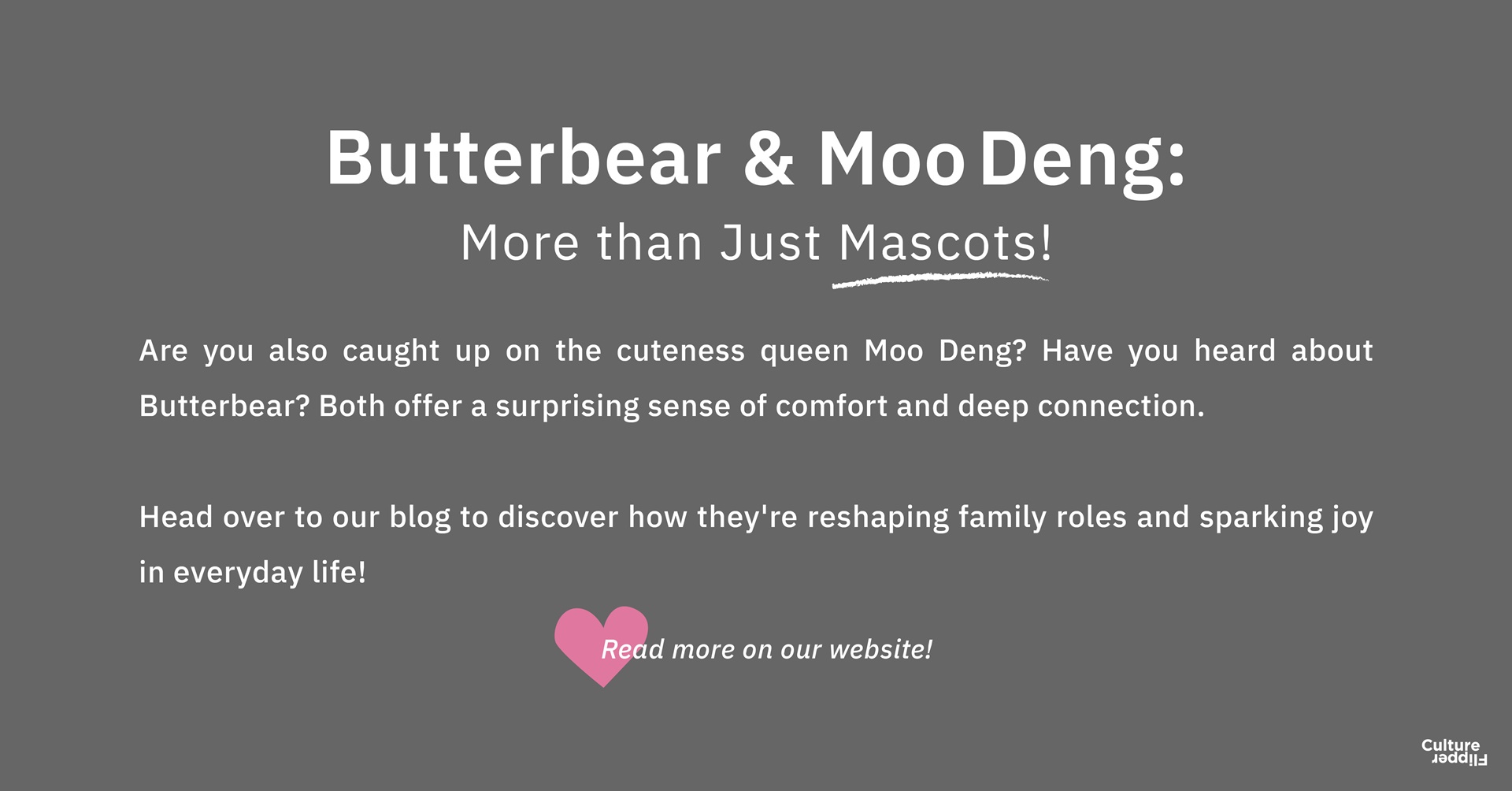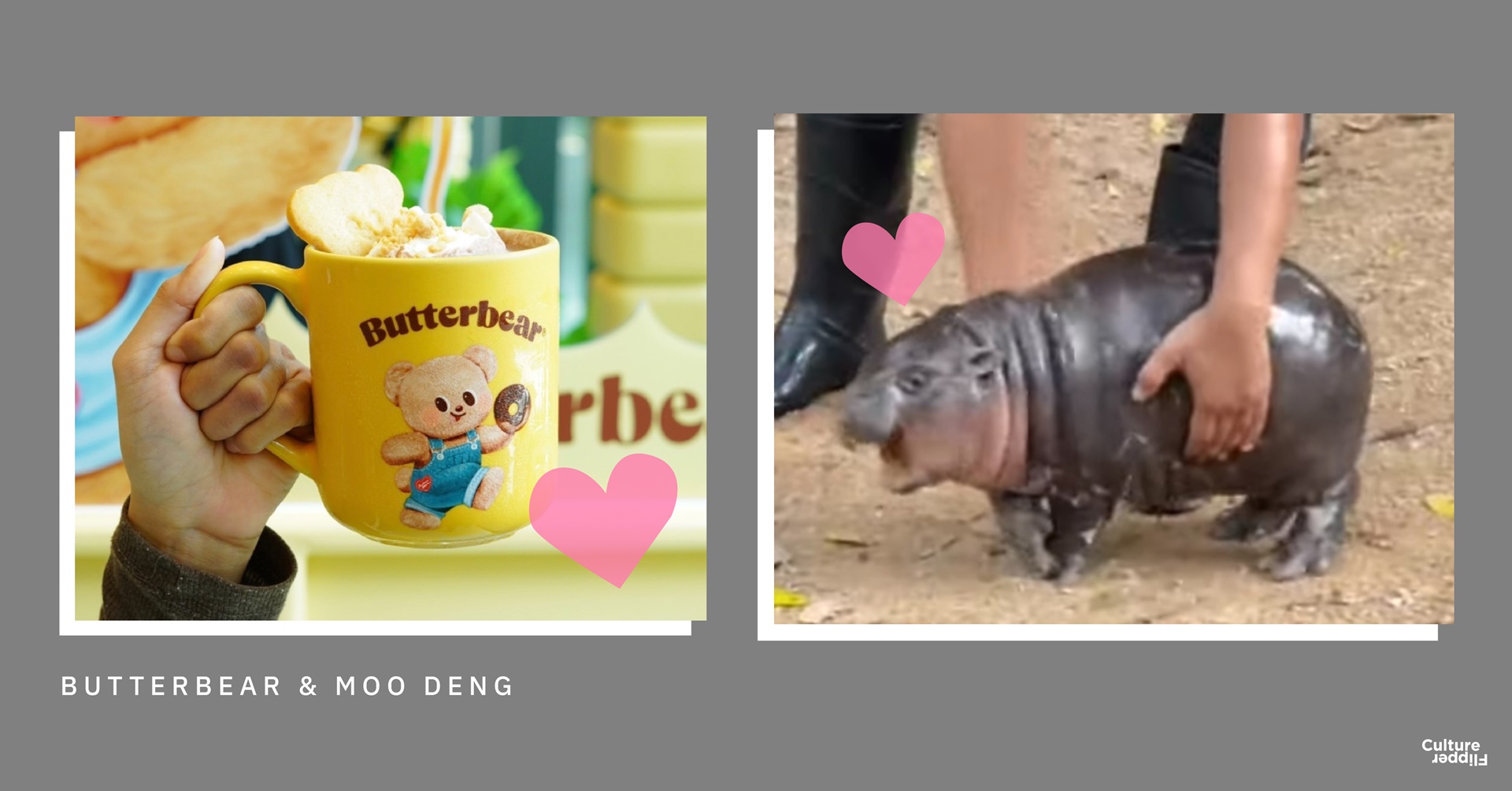
“Hey! I just wanted to let you know that I finally got that Butterbear mug for you!” my cousin said triumphantly over the phone, after a long successful mission.
“Aww, thank you! Did you get everything you wanted? And how long did it take?” I asked.
“Three hours, totally worth it. I got mugs, PJs, totes–couldn’t decide which one I liked more, so I bought two!”
“Three hours!?” I gasped, surprised. This wasn’t her usual style.
“Well, it wasn’t so bad. We all passed the time chatting. I made a few friends–there was someone who took the day off and drove from Khon Kean! Oh, and a sweet lady in her seventies. I got a secondhand backache just hearing her story, but it was fun. We talked about Butterbear the whole time.”
This isn’t an isolated incident. In 2024, major phenomena have captured the hearts of many Thais: Butterbear, a mischievous mascot with a child-like charm, and Moo Deng, a baby pygmy hippo whose amusing behaviors are a daily source of joy for many. Interestingly, the biggest fans are not children or younger folks, but people in their 30s, 40s, and 50s–like my 40-year-old, childless cousin and me at 33.

Butterbear, fondly referred to by her fans as a “national daughter”, has created a fan community that proudly calls themselves “Mom Mee” (a playful twist on “mee”, the Thai word for bear, and “mommy”). On her social media, Butterbear shares snippets of her fictional life–going to school, sneaking snacks, and playing with toys–evoking the innocence of a mischievous child. With over 40,000 members in LINE Open Chat, the fandom actively shapes her personality. This makes her feel like she’s part of our family–our collective imagination made real.
On the other hand, Moo Deng, the baby pygmy hippo from a zoo in Chonburi, has garnered an even larger following. Her story is deeply connected to “Kamoo and the Gang”, a cleverly-built online community that introduced us to her family long before she was born. This community helped Thai people follow her parents and siblings, and when Moo Deng had finally arrived, she wasn’t just another zoo baby–she was a beloved figure whose name was chosen by the public through a vote! Watching her grow and play–whether it’s nipping at her zookeeper’s legs or enjoying a good nap–reminds us of her sweet, childlike nature. It’s no wonder people view her as a “national little girl”.
This trend of assigning familial roles to loveable mascots and animals doesn’t stop at Butterbear and Moo Deng. It seems to be part of a broader cultural practice–one that’s especially evident as our society evolves. In the past, most Thai households were extended families, with grandparents, parents, and children living under the same roof. People had a strong connection to family, and caring for the younger generation was deeply ingrained in our culture. Nowadays, though, families are smaller. Many people are living independently, some without children at all. So, is it possible that mascots and animals like Butterbear and Moo Deng have stepped in to fill a void, becoming the substitute for the traditional family roles that are fading?
Both Butterbear and Moo Deng bring a baby-charm that resonates emotionally with Thai people. There’s something about their stories, their routines, and the way we, as a community, interact with them that strikes the chord, especially in a society where loneliness and aging are becoming more common. They offer a chance to care for something innocent and loveable, and they come with none of the risks or heartbreaks that real-life relationships can sometimes bring. These characters might represent more than just cute distractions, but they could reflect a shift in how we seek connection and affection in a digital world, offering comfort and a sense of community as traditional family dynamics evolve.
At the end of the day, whether you’re a Butterbear “Mom Mee” or part of Moo Deng’s fan club, there’s no denying the joy these two charming icons bring. They’re a testament to the power of imagination, connection, and our eternal love for something adorable. And if standing in line for three hours for a Butterbear mug is any indication, I’d say the trend of treating anything cute and heartwarming as part of the family isn’t going anytime soon. Count me in!
